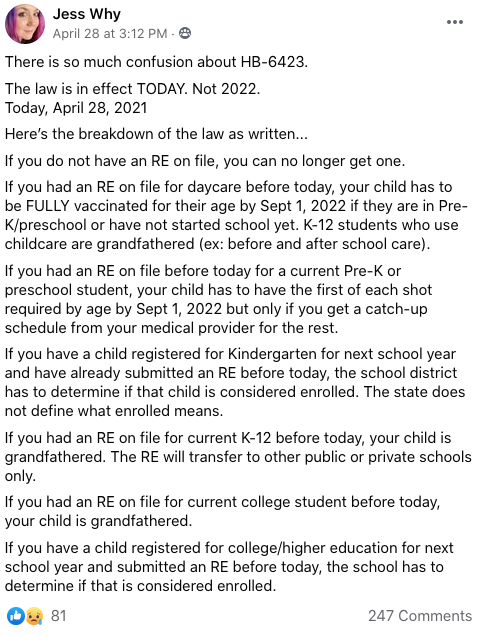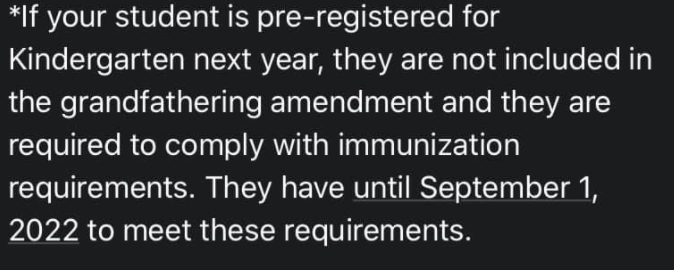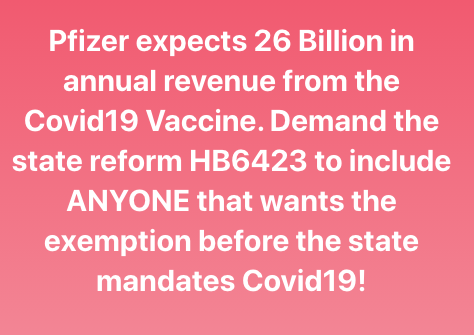Connecticut Governor Ned Lamont, on April 28, signed HB6423 into law—disappointing many residents and parents who have been fighting for months against the legislation, as reported by UncoverDC in February. The bill prevents parents from citing religious or philosophical beliefs in refusing to vaccinate their children. The final Senate vote was 22 to 14, with two Democrats—Sens. Cathy Osten of Sprague and Dennis Bradley of Bridgeport—joining the Republicans in rejecting the measure. The religious exemption will be null and void on Sept. 1, 2022. Lamont's press release can be found here.
According to reporting by the Connecticut Mirror:
"Since 1959, Connecticut has required that children attending school receive vaccines against certain diseases including measles, mumps, rubella, and chickenpox before enrollment. When required immunizations were signed into law, the legislature established two distinct types of exemptions. A medical exemption can be claimed by students with health conditions that bar them from receiving certain vaccines. The other exemption allows students to opt-out of receiving vaccines if the family’s religious views conflict with receiving certain vaccines. Historically, religious exemptions have not posed a threat to public safety in Connecticut. Now, however, the number of students claiming these exemptions has grown significantly, causing great concern. During the 2017-18 school year, 7,042 children across all grade levels claimed the religious exemption. By the 2018-19 school year, the number jumped to 7,782, and 8,328 students claimed the exemption in the 2019-20 school year." Importantly, Connecticut has had religious exemption since 1959, when the first vaccine for polio was introduced.
Reporting by NBC Connecticut indicates that some legislators feel strongly that exemptions from childhood vaccines put the public at risk. The article quotes Rep. Jaime Foster, D-Ellington, as having said that the "bill was not controversial 'for those with expertise...When you trust scientists, when you trust medical providers, the choice is not hard.'" The article also stated that she said the "'financial consequence' of the 2018 measles outbreak in New York was $8.4 million. Between 2004 and 2017, the median cost of a measles outbreak was $32,000, per case, according to another peer-reviewed study cited by Foster."
Connecticut legislators have tried for years to pass such a bill, and many think that the Covid19 virus finally gave them the boost they needed. For now, the law refers to childhood vaccines; however, UncoverDC readdressed the issues with Kate Kraemer on Tuesday now that the bill has passed. Kraemer worries that a Covid19 vaccine mandate is just around the corner—meaning the vaccine would be added to the list of required childhood vaccines to attend school.
In the follow-up interview, UncoverDC asked Connecticut resident and parent activist Kate Kraemer where things stand with the parent initiatives in the state now. Kraemer is associated with the Connecticut Freedom Alliance and is also an admin for the Facebook page with 18,000 members called Connecticut Residents Against Medical Mandates (CTRAMM). She has also created a website with the same name. She and other parents organized another huge rally on the day the legislation was passed where, she estimates, 7,000 to 8,000 people attended.
 Parents Call the Shots Rally/Connecticut/April 27, 2021
Parents Call the Shots Rally/Connecticut/April 27, 2021
Kraemer told UncoverDC that Lamont has said he is announcing guidance for the exemption on Friday, and she suspects he will also indicate his support for a vaccine mandate that day.
"This is a ticking time bomb," Kraemer stated, "So many parents here are up in arms. Many parents were unaware and learned just days before the bill was passed that the exemption would be taken away. They thought they were safe; they had their paperwork submitted. However, language in the bill (the word enrollment) makes it difficult to discern what the law actually means. Parents thought if they had their paperwork by the 28th, they were safe. The law also leaves open the decisions to comply with the legislation up to the individual superintendents in each school district. There is a conflict of interest there too because the attorneys who submit guidance to 80 percent of Connecticut schools are associated with the same law firm where House Speaker Matt Ritter's sister works."
 CTRAMM Facebook Post
CTRAMM Facebook Post
The Democrat attorney and Speaker follows in his father George Ritter's footsteps. Rep Matt Ritter is the representative for District 1-Hartford. According to Kraemer, he is popular and well ensconced in the community, and his "hard push" to pass the bill was really what instigated the bill in the first place. Ritter Sr. was also Speaker and has connections to the pharmaceutical industry, according to Kraemer.
UncoverDC confirmed that Ritter Sr. does seem to have a history with the drug industry because of his association with a "division of Brown Rudnick—a law and lobbying firm that represents drug manufacturer Boehringer Ingelheim and the Healthcare Distribution Alliance. The latter describes itself as 'the national organization representing primary pharmaceutical distributors,'” as reported by the International Business Times in 2017. The article states that he ran that division.
The meaning of the word "enrollment" is the language that is causing confusion. Many parents understood enrollment to mean registered by April 28. However, some school officials have pushed back, saying that, really, enrollment means your child must not only be registered but already enrolled as a current student in the school to be grandfathered in. This could mean that parents who have first-time pre-k registrations would not be able to cite a religious exemption for childhood vaccines.
 Exemption Confusion/CTRAMM Facebook post
Exemption Confusion/CTRAMM Facebook post
Additionally, there has also been confusion about the actual deadline. Some parents have received communications from school officials indicating that their children would not be grandfathered in unless their paperwork was submitted by April 27. The Governor signed the bill into law on April 28, so many understood that date to be the deadline. The following post was captured from a parent asking for clarification on a school nurse's response regarding the confusing deadlines for paperwork.
 Help Us/Parents In CT/Grandfather Deadline
Help Us/Parents In CT/Grandfather Deadline
 Help Us/Grandfather Deadline 2
Help Us/Grandfather Deadline 2
 Help Us/Grandfather Deadline/3
Help Us/Grandfather Deadline/3
Governor Lamont, according to Kraemer, has "boasted of his state's vaccination rates" on multiple occasions. Lamont is on record as having been a strong proponent of opening vaccine clinics in high schools in anticipation of, at that time, a rumored push by the FDA to authorize the use of the Pfizer Bio-NTech vaccine for children ages 12-15. And, in fact, the authorization came on Monday, May 10. As reported by a May 3 Patch article, the Governor was quoted as having stated that such clinics and an "accompanying end-of-summer jab campaign" could be "very helpful in building confidence to get kids back into school in the fall."
A May 10 press conference that aired on the day of the FDA announcement confirms his wish to vaccinate children in that age group. The press conference also confirms his and his administration's strong commitment to the vaccine as a way to protect the citizens of Connecticut.
Acting Commissioner of Education for the Connecticut State Department of Education, Charlene Russell-Tucker also spoke glowingly, saying she is "so thrilled" about the rate of vaccinations for 50 percent of 15 and 16 year-olds who are "standing together in line" to get the shots. She continued, saying that she is excited that 12 to 15-year-olds will now have access to the shots.
 CTRAMM Facebook Page post
CTRAMM Facebook Page post
"There is something to be said about kids being able to gather together with their own peer pressure amongst each other to be able to stand in line and get their shots. So we are really excited about that to make sure families know—to make sure we have the approvals necessary so that kids are able to do that."
Several parents and organizations have already filed one federal lawsuit against several state offices and boards of education to fight the removal of the religious exemption. A state lawsuit is in the works, according to Kraemer. Under the law, Connecticut became the sixth state, joining California, New York, Mississippi, W. Virginia, and Maine without a religious or comparable exemption, according to the National Conference of State Legislatures.
 Map of Philosophical or Religious Exemptions from Vaccines/NCSL
Map of Philosophical or Religious Exemptions from Vaccines/NCSL
There is also a movement to reform HB6423; however, Kraemer does not think there is enough time to do that by the close of the legislative session on June 9. Parents, however, have awakened to the idea that they must, in the meantime, start thinking about becoming members of the Boards of Education and running for local office. She and many other parents fully expect that the Covid19 vaccine will be added to the list of mandated childhood vaccinations if Governor Lamont gets his way. An announcement from the Governor is said to be coming on Friday with guidance for the state's schools.
 Reform/CTRAMM Facebook Page
Reform/CTRAMM Facebook Page


